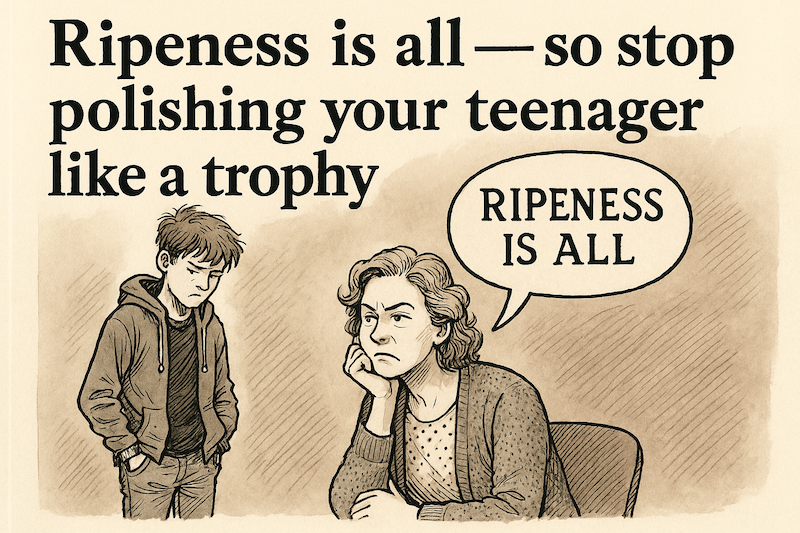Edgar’s offhand wisdom in King Lear – “ripeness is all” – is a marvellous thing to whisper into the ear of any parent currently living with a human in the body of a hormonal small asteroid. It isn’t a rallying cry for control, nor a promise of tidy victories. It’s the quiet, knotted knowledge that some growth can’t be manufactured, only allowed. Which, inconveniently, is the opposite of the thing modern parenting manuals sell you between adverts for matching family pyjamas.
So here’s a controversial little manifesto for parents of teenagers: stop believing you can fix adolescence. Stop pretending you can prevent pain, manufacture success, or sculpt character in studio lightning. Instead, remember – properly, painfully – what it felt like to be them. Then use that memory as your moral map rather than your panic button.

1. Let them be unripened. That’s the point.
Maturity isn’t a product you can unwrap on schedule. It’s a process of bruising, fumbling and, occasionally, glorious wrong turns. If you smother every scrape with an antiseptic of your own making – calls to teachers, calls to employers, deletion of humiliating posts – you rob them of the chance to become ripened. Let natural consequences do their slow, wise work. Yes, it can be messy. Yes, you will be tempted to step in. Resist. Your offspring needs a chance to learn how to rebuild a bruised ego without you handing them a new one.
2. Stop being their best friend; be their believable adult.
There’s a romantic fantasy that if you’re pals with your teenager you’ll be trusted. The blunt fact: teenagers crave adults who are recognisable as grown-ups. They want predictability, boundaries and the occasional very dry lecture that smells faintly of authority. Be consistent. Be human. And for heaven’s sake – let them hate you for a while. It’s part of the curriculum.
3. Remember you were once dreadful, too. Use that.
Parents routinely bottle their teenage selves away in a cupboard labelled Never Again, and then act surprised when similar garments reappear in their children’s behaviour. Don’t sanitise your recollection. Recall the petty cruelties, the ridiculous bravado, the smoky panic of trying not to be seen as small. Share one embarrassing anecdote. It humbles you, humanises you, and – crucially – cuts through the performative counsellor tone that teenagers detest.

4. Praise less, expect more.
The world doesn’t give participation trophies forever. Hyper-praise floods the learning pond with sugar and makes resilience float away. Teach standards, demand effort, and celebrate the quiet, stubborn jobs done well – not the theatrical displays engineered for social media. Let them earn the praise; the sting of not getting it will teach more than praise ever could.
5. Let boredom be a curriculum subject.
We have weaponised entertainment. Teenagers are experts at numbing themselves with curated content until their brains forget how to create. Insist on pockets of boredom. No phones at dinner, no screens an hour before bed, and yes – a period each week where they have to figure something out that isn’t measured by likes. Creativity, resilience and the ability to entertain oneself are cultivated in the soil of tedium.
6. Allow them safe-ish failures, not catastrophic ones.
There’s a difference between letting your child flounder and letting them fall off a cliff. Be strategic. Let them miss a deadline, have a friendship implode, fail an exam, taste the unpleasantness of hypocrisy – but keep the ladders nearby for things that would permanently derail their life. Think of yourself as a safety-net with dignity: present, but not micromanaging.
7. Stop outsourcing their moral education to algorithms.
Values don’t get taught by TikTok trends. They’re handed down awkwardly at the dinner table, modelled in small acts, argued over in the bath, discovered by walking home from a bad decision and seeing the stars. Be annoyingly moral in the everyday: apologise when you should, admit mistakes, explain why you voted or why you recycle. Hypocrisy is the fastest way to make your teenager’s moral compass revolve around convenience.
8. Encourage friendships – even the ones you don’t approve of.
This will make your stomach clench, naturally. But teen friendships are laboratories for empathy, negotiation and survival. If you over-police them you create an underground social economy of secrecy. Instead, set safety parameters, know who their friends are (not where they go, but who they are), and be the parent who asks questions rather than immediately launching sanctions.
9. Teach them to tolerate uncertainty.
“Ripeness” is less about having answers than about living with the unknown without performing panic. Give them experiences where outcomes are unknown: travel, volunteering, jobs that aren’t about CV-chasing. Let them see adults cope with not-knowing. That’s the real education they won’t get at school.
10. Love them without project-managing them.
This is the hardest. The urge to optimise every variable in your child’s life is powered by fear — fear they’ll suffer more than you did, or miss opportunities you didn’t have. But love becomes a blight when it’s conditional on performance. Keep the love unconditional, the expectations high, and your interventions surgical, not theatrical.
If you take one thing from this ‘sermon’ in my slightly singed tone, it is this: don’t rush ripening. Your job is not to manufacture maturity but to provide a climate in which it can grow – blustery winds and sudden storms included. Adolescence is not a glitch to be patched but an essential ferment. Step back. Breathe. Recall with embarrassing clarity how you once thought you were immortal, and how that belief was exquisitely, exquisitely dismantled. Then let the dismantling happen for your teenager too – with you nearby, not at the controls.
Now go and put the kettle on. You’ll need it.
Related articles
Lady Rantingham: The unconventional Voice with a bit of sass
Meet Lady Rantingham, a witty and rebellious spirit who brings a fresh twist to the “Rant” theme. While her name might evoke a touch of aristocracy, she’s anything but conventional. With a playful, humorous tone and a slight air of authority, Lady Runtingham is here to run riot on just about anything – especially the things that bother her.
Whether it’s the little annoyances of everyday life or the larger absurdities of the world around her, Lady Runtingham isn’t afraid to call out what grinds her gears. Her rants are filled with sharp wit, unfiltered thoughts, and an unapologetic perspective that blends rebellion with a dash of humour.
Her commentary goes beyond just mockery; she touches on everything from societal quirks to the frustrating intricacies of modern life, all while maintaining a sense of lighthearted authority. Lady Runtingham isn’t just runting about the monarchy — she’s ranting about anything that makes her roll her eyes.


